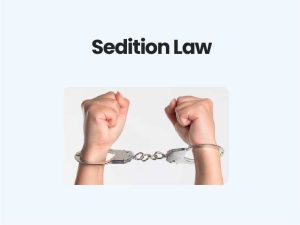Currently, Section 124A provides for life imprisonment or imprisonment upto 3 years. The Commission has suggested that the jail term of 3 years be enhanced to 7 years.
The 22nd Law Commission of India headed by former Chief Justice of Karnataka High Court Ritu Raj Awasthi has recommended that Section 124A of the Indian Penal Code (IPC), which criminalises sedition, should be retained in the statute book with certain changes.
A three-judge bench of the Supreme Court headed by the then Chief Justice of India N V Ramana had on May 11, 2022, put the provision in abeyance instead of deciding on its validity.
This was after the Central government told the Court that it will re-examine and reconsider whether Section 124A needs to be retained.
In its report, the Law Commission said that “Section 124A needs to be retained in the Indian Penal Code, though certain amendments, as suggested, may be introduced in it by incorporating the ratio decidendi of Kedar Nath Singh v. State of Bihar so as to bring about greater clarity regarding the usage of the provision.”
Importantly, the Commission further recommended that the scheme of punishment provided under the Section be amended.
Currently, it provides for life imprisonment or imprisonment upto 3 years.
The Commission has suggested that the jail term of 3 years be enhanced to 7 years.
“The 42nd Report of the Law Commission termed the punishment for Section l24Ato be very ‘odd’. It could be either imprisonment for life or imprisonment up to three years only, but nothing in between, with the minimum punishment being only fine. A comparison of the sentences as provided for the offences in Chapter VI ofthe IPC suggests that there is a glaring disparity in the punishment prescribed for Section 124A. It is, therefore, suggested that the provision be revised to bring it in consonance with the scheme of punishment provided for other offences under Chapter VI. This would allow the Courts greater room to award punishment for a case of sedition in accordance with the scale and gravity of the act committed,” the report said.
Section 124A of IPC, as it stands currently, reads as follows:
Sedition-Whoever by words, either spoken or written, or by signs, or by visible representation, or otherwise, brings or attempts to bring into hatred or contempt, or excites or attempts to excite disaffection towards, the Government established by law in lndia, shall be punished with imprisonment for life, to which fine may be added, or with imprisonment which may extend to three years, to which fine may be added, or with fine.
However, the Law Commission has now recommended to alter the Section as:
“Whoever by words, either spoken or written, or by signs, or by visible representation, or otherwise, brings or attempts to bring into hatred or contempt, or excites or attempts to excite disaffection towards, the Government established by law in lndia, with a tendency to incite violence or cause public disorder shall be punished with imprisonment for life, to which fine may be added, or with imprisonment of either description for a term which may extend to seven years, to which fine may be added, or with fine.”
The expression “tendency” would mean mere inclination to incite violence or cause public disorder rather than proof of actual violence or imminent threat to violence, the report clarified.
The Commission also suggested that no FIR dealing with Section 124A be registered “unless a police officer, not below the rank of Inspector, conducts a preliminary inquiry and on the basis of the report made by the said police officer the Central Government or the State Government, as the case may be, grants permission for registering a First Information Report. “
Towards this end, the report said that an amendment may be introduced in Section 154 of CrPC by incorporating a proviso.
Responding to the contention of other countries doing away with the law on sedition, Justice Awasthi led commission opined that “repealing Section 124A of IPC on the mere basis that certain countries have done so is essentially turning a blind eye to the glaring ground realities existing in India.”
On the argument that sedition law must be scrapped owing to it’s colonial legacy, the Commission stated that people are at liberty to indulge in healthy and constructive criticism of their government in a democratic set-up but what Section l24A of IPC seeks to penalise is only the pernicious tendency to incite violence or cause public disorder in the guise of exercising right to freedom of speech and expression.



